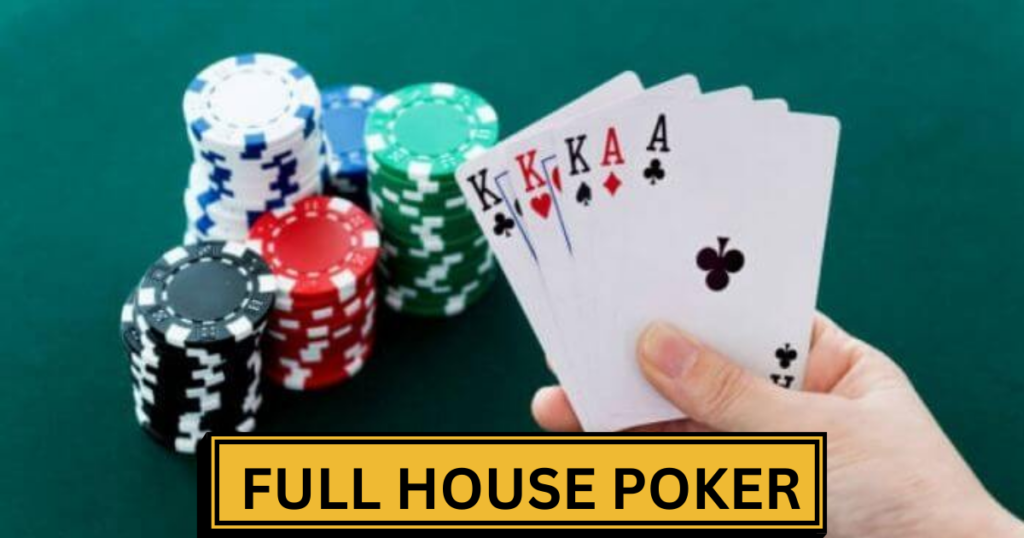
Full House Poker is an exciting poker variation that adds a unique twist to the classic game. If you’re looking to try something new and elevate your poker skills, you’ve come to the right place. In this guide, we’ll break down Full House Poker’s fundamentals, strategies, and tips to help you become a skilled player. For an even more immersive poker experience, check out platforms like Extreme Gaming 88, where you can explore exciting variations and take your poker game to the next level.
Let’s kick things off with the basics. Full House Poker uses a standard 52-card deck, just like many other poker games you might have played. However, what makes it stand out are the rules and objectives.
In Full House Poker, your main goal is to build a winning hand and collect chips from your opponents. Unlike some traditional poker games where the highest hand wins, here, you’re aiming for specific combinations, which we’ll get into soon.
The game offers a refreshing change from the usual poker variations like Texas Hold’em and Omaha, providing a unique gaming experience.
Before you dive into Full House Poker, it’s essential to grasp what makes a hand a “Full House.” In this game, a Full House consists of three of a kind and a pair. For example, having three 7s and two Jacks would give you a Full House.
Full Houses are ranked based on the three of a kind part. For instance, a Full House with three Aces and two Kings ranks higher than one with three Queens and two 8s. Knowing these rankings is crucial for making smart decisions while playing.
If you’re curious about the odds and probabilities of getting a Full House, don’t worry; we’ll cover that too.
Now, let’s talk strategy. In Full House Poker, as in any poker game, your decisions matter. Here are some key strategies to keep in mind:
These are just a few strategic pointers to get you started. As you gain experience, you’ll develop your unique style and approach to Full House Poker.
Full House Poker offers some room for rule variations and house-specific rules. Understanding these variations can impact your gameplay and strategy significantly. It’s essential to get familiar with the rules in play, whether you’re at a friendly home game or a casino.
Additionally, there are popular Full House Poker variants like “Deuces Wild” and “Jacks or Better,” each with its set of rules. These variants introduce exciting twists and challenges, adding even more diversity to the game.

Now, where and how you play Full House Poker can make a difference. There are advantages and disadvantages to playing online and in live settings.
Online Play: Playing Full House Poker online offers convenience and accessibility. You can find a game at any time, from the comfort of your home. Online platforms often provide a wide range of skill levels, so you can choose tables that match your expertise.
Live Play: Live Full House Poker offers a social experience and the opportunity to read your opponents’ physical tells. It can be more immersive and enjoyable if you prefer face-to-face interactions. However, finding live Full House Poker games may be limited to certain locations or events.
Adapting your strategy to the environment is essential. Online games may require a different approach than live ones, so be ready to adjust accordingly.
Let’s talk about managing your poker bankroll. Regardless of whether you’re playing for fun or aiming to make a profit, responsible bankroll management is crucial.
Setting Limits: Determine how much you’re willing to spend on Full House Poker and stick to it. Avoid the temptation to chase losses or bet more than you can afford.
Mitigating Losses: Losing streaks happen to the best of us. When faced with losses, it’s essential to maintain discipline and not go on tilt by making reckless bets.
Maximizing Winnings: On the flip side, when you’re winning, consider setting aside a portion of your profits. It’s a way to ensure that you leave the table with more than you started.
Here are some additional tips and tricks to enhance your Full House Poker experience:
Stay Focused: Poker requires concentration. Avoid distractions, and give each hand your full attention.
Learn from Mistakes: Don’t be discouraged by losses. Instead, use them as opportunities to learn and improve your game.
Continuous Improvement: The best poker players are always seeking ways to improve. Whether it’s studying the game, reviewing your play, or seeking advice from experienced players, strive for ongoing growth.
Lastly, let’s talk about the importance of player etiquette and sportsmanship in Full House Poker.
Dos and Don’ts: Be respectful and considerate at the table. Avoid slow play, excessive chatter, or poor sportsmanship.
Graceful Winner and Loser: Whether you win or lose, maintain a positive and respectful attitude. Nobody likes a sore winner or a sore loser.
Building a Positive Community: Poker is a game that brings people together. Encourage friendly competition, camaraderie, and a welcoming atmosphere at the poker table.
You’ve just embarked on a journey into the world of Full House Poker! Armed with a solid understanding of the rules, strategies, and etiquette, you’re well on your way to becoming a formidable player.
Remember, Full House Poker is as much about skill as it is about enjoyment. While winning is rewarding, the camaraderie and excitement of the game are equally valuable. So, embrace the challenges, enjoy the victories, and keep refining your skills. Whether you’re playing with friends or competing in a high-stakes casino, Full House Poker offers a thrilling and endlessly captivating experience. So, shuffle those cards, place your bets, and may the Full Houses be ever in your favor!
Q1: What is Full House Poker, and how does it differ from traditional poker games?
A1: Full House Poker is a unique poker variant where the goal is to create specific hand combinations. It differs from traditional poker games like Texas Hold’em by focusing on creating Full House hands rather than aiming for the highest hand.
Q2: What constitutes a Full House hand in Full House Poker?
A2: In Full House Poker, a Full House hand consists of three of a kind and a pair. For example, having three 7s and two Jacks makes a Full House.
Q3: How do I improve my Full House Poker strategy for starting hands?
A3: Start by being selective with your hands. Fold weaker hands and save your chips for stronger ones. Understanding the value of your starting hand is crucial.
Q4: Can you explain the importance of position in Full House Poker?
A4: Your position at the table affects your strategy. Players who act later have more information and an advantage. Those who act early should be cautious.
Q5: What are some tips for effective bluffing in Full House Poker?
A5: Bluff sparingly and strategically. Use your opponents’ behavior and betting patterns to your advantage. Overbluffing can backfire.
Q6: Are there variations of Full House Poker, and how do they change the game?
A6: Yes, there are variants like “Deuces Wild” and “Jacks or Better.” These introduce unique rules and twists that can significantly impact gameplay and strategy.
Q7: What’s the difference between playing Full House Poker online and in a live setting?
A7: Online play offers convenience and accessibility, while live play provides a social experience and physical tells. Online and live environments may require different strategies.
Q8: How can I effectively manage my bankroll in Full House Poker?
A8: Set spending limits, avoid chasing losses, and consider setting aside a portion of your winnings. Responsible bankroll management is essential.
Q9: What are some common dos and don’ts regarding player etiquette in Full House Poker?
A9: Be respectful and considerate at the table, avoid slow play, and maintain a positive attitude whether you win or lose. Encourage a friendly atmosphere.
Q10: Where can I find resources to learn more about Full House Poker and improve my skills?
A10: You can find books, online tutorials, and poker communities that offer valuable insights and opportunities to enhance your Full House Poker skills.